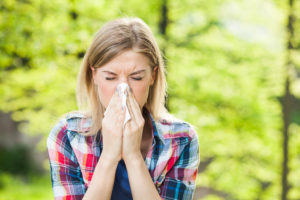March 14, 2016 | Black & Kletz Allergy

As Vienna allergists, we see that the manifestations that allergy sufferers experience vary in both the type and severity of the symptoms. Some of the classic symptoms of Spring hay fever may include sneezing, runny nose, itchy nose, nasal congestion, post-nasal drip, itchy roof of the mouth, itchy ears, itchy eyes, watery eyes, redness of the eyes, puffy eyes, dark circles under the eyes, sinus congestion, sinus headaches, sinus pain, fatigue, and, snoring. If the allergies effect the lungs, they can cause or exacerbate asthma symptoms such as wheezing, shortness of breath, chest tightness, and/or coughing.
Given the above, there are 7 simple ways to get ready for the tree pollen in the Spring which are as follows:
1.) Check the pollen count, so you know when the counts are high, so you can avoid being outdoors, if possible. (You can check the pollen count by clicking Today’s Pollen Count or clicking it at the top right of our website daily.)
2.) Try to minimize your exposure to the tree pollen by closing the windows in your home and car and turning on the air conditioner and setting it to “re-circulate” so it will not bring in outside air that is high in tree pollen.
3.) Be proactive and begin using prescribed or over the counter nasal sprays a few days prior to when you normally begin to feel the symptoms of tree pollen allergies.
4.) If you go outdoors or enjoy exercising outside, try to avoid exercise early in the morning as the pollen count tends to be highest at these times.
5.) If outdoors for a prolonged period of time during the tree pollen season, shower and change your clothes as soon as you re-enter your home.
6.) Minimize your contact with pets and individuals who have spent a lot of time outdoors as they will bring the pollen to you.
7.) Wear sunglasses to prevent the tree pollen from directly entering your eyes.
In addition to the above 7 ways to help prevent the tree pollen from aggravating your allergies, there a multitude of medications that can be taken in order to help reduce allergy symptoms you can get from your Vienna allergist. The medications come in the forms of tablets, capsules, powders, syrups, nasal sprays, and inhalers. Allergy shots (i.e., allergy injections, allergy immunotherapy, allergy desensitization) are an extremely effective treatment for hay fever and asthma. They are effective in 80-85% of patients that take allergy shots. They take about 4-6 months to become effective and the average person is on allergy shots for 3-5 years.
The board certified allergists of Black & Kletz Allergy have been diagnosing and treating both adults and children in the Washington, DC, northern VA, and Maryland metropolitan area for over 50 years. We have offices in Washington, DC, McLean, VA (Tysons Corner, VA), and Manassas, VA. There is on-site parking at all of the offices. The Washington, DC and McLean, VA office locations are Metro accessible and there is a free shuttle that runs between our McLean office and the Spring Hill metro station on the silver line. The Vienna allergy doctors of Black & Kletz Allergy specialize in all types of allergic conditions including hay fever, asthma, sinus disease, hives, eczema, swelling problems, food and medication allergies, and immunological disorders. If you would like to schedule an appointment, please call us or alternatively you can click Request an Appointment and we will respond back to you within 24 hours on the next business day.












